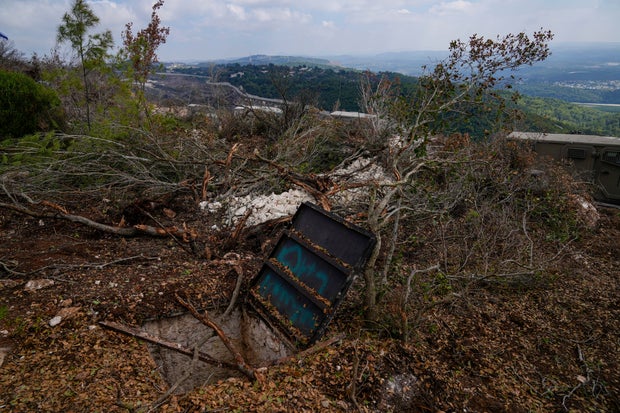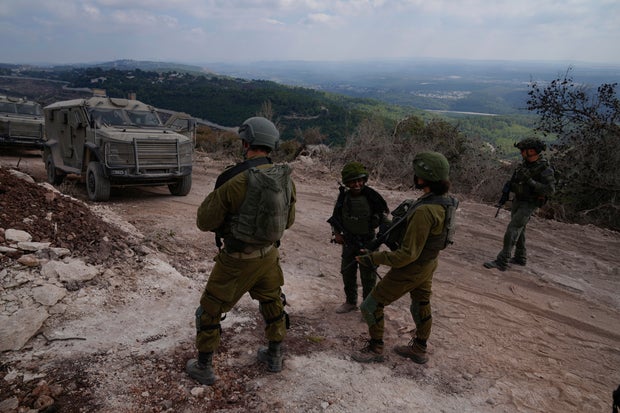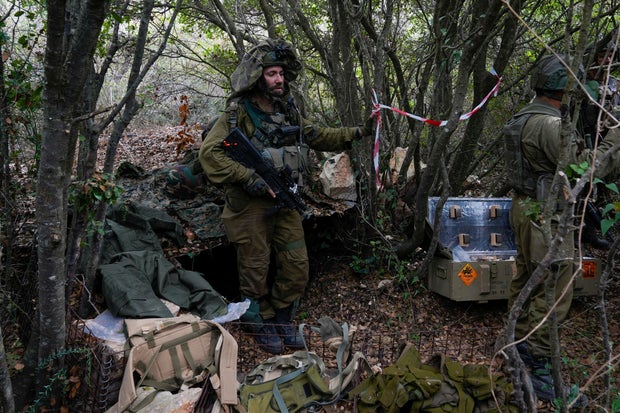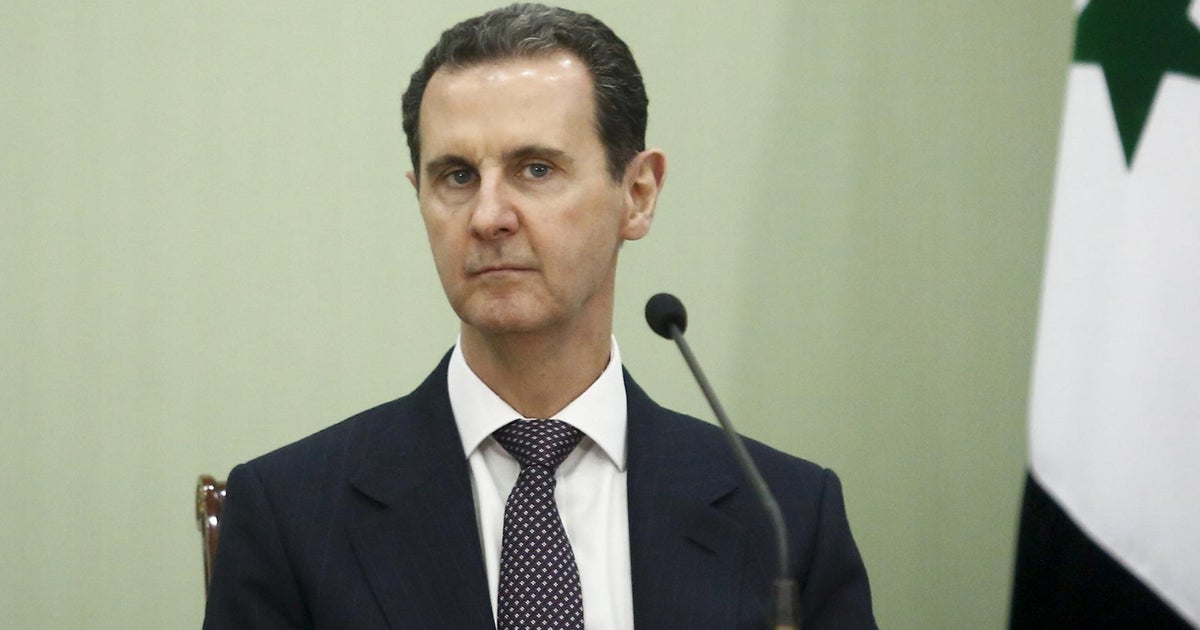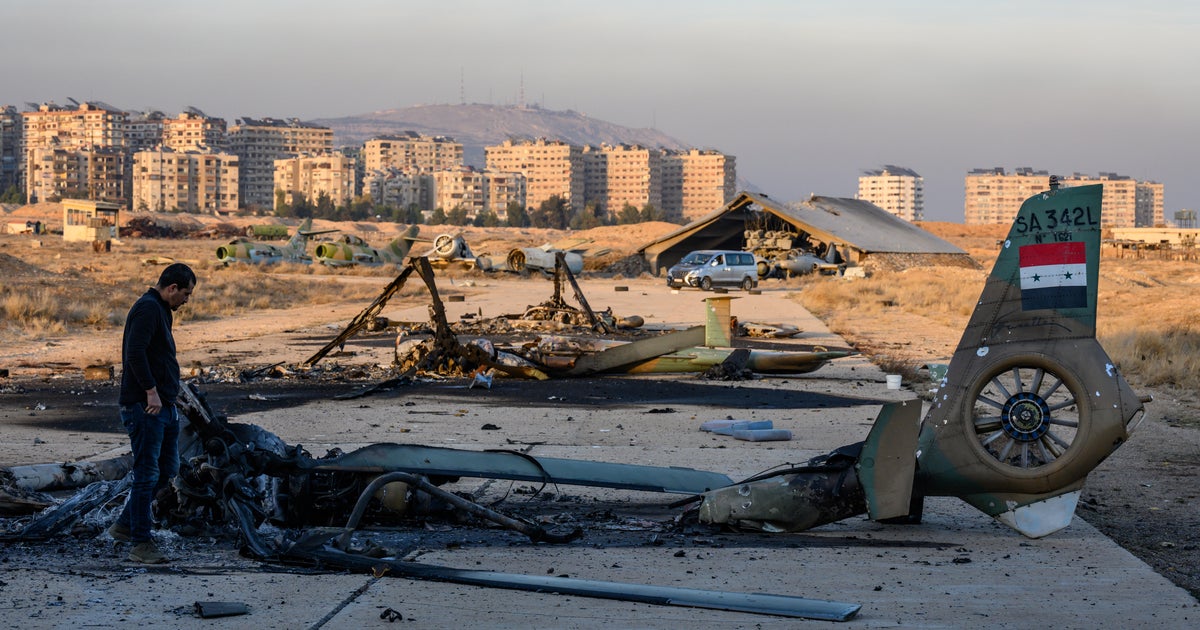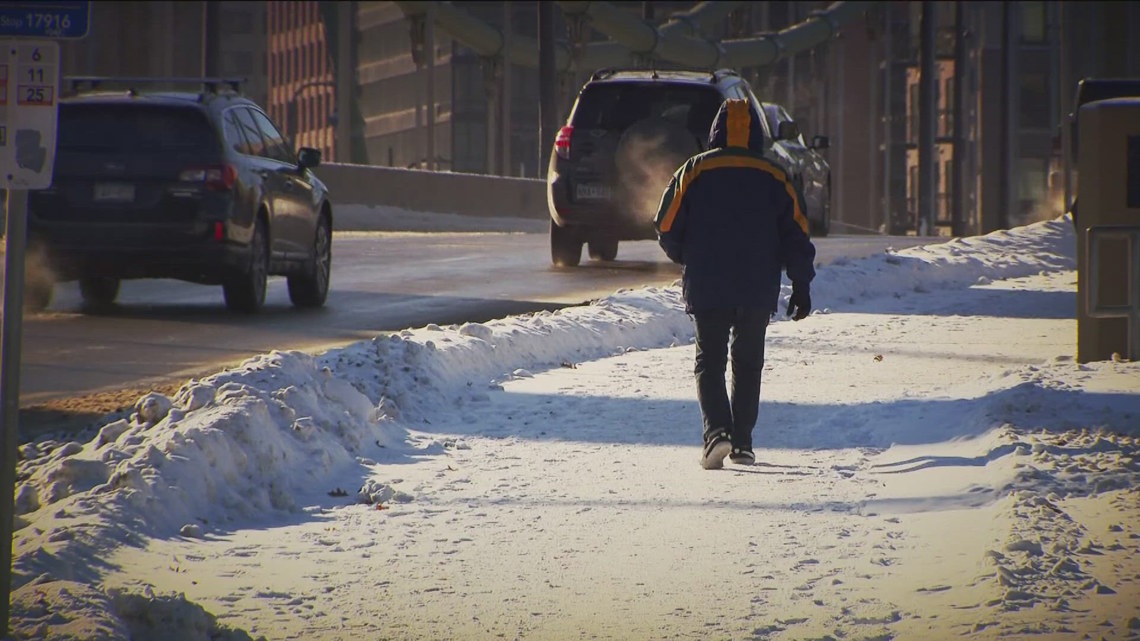CBS News
Israel unearths a web of tunnels used by Hezbollah in southern Lebanon

Israeli forces have spent much of the past year destroying Hamas’ vast underground network in Gaza. They are now focused on dismantling tunnels and other hideouts belonging to Hezbollah militants in southern Lebanon.
Scarred by Hamas’ deadly raid into Israel last year that sparked the war in Gaza, Israel says it aims to prevent a similar incursion across its northern border.
The Israeli military has combed through the dense brush of southern Lebanon for the past two weeks, uncovering what it says are Hezbollah’s deep attack capabilities — highlighted by a tunnel system equipped with weapons caches and rocket launchers that Israel says pose a direct threat to nearby communities.
Sam McNeil / AP
Israel’s war against the Iran-backed militant group stretches far inside Lebanon, and its airstrikes in recent weeks have killed more than 1,700 people, about a quarter of whom were women and children, according to local health authorities. But its ground campaign has centered on a narrow patch of land just along the border, where Hezbollah has had a longstanding presence.
Hezbollah has deep ties to southern Lebanon
Hezbollah, which has called for Israel’s destruction, is the Arab world’s most significant paramilitary force. It began firing rockets into Israel a day after Hamas’ Oct. 7, 2023, attack from Gaza. After nearly a year of tit-for-tat fighting with Hezbollah, Israel launched its ground invasion into southern Lebanon on Oct. 1 and has since sent thousands of troops into the rugged terrain.
Even as it continues to bolster its forces, Israel says its invasion consists of “limited, localized and targeted ground raids” that are meant to destroy Hezbollah infrastructure so that tens of thousands of displaced Israelis can return home. The fighting also has uprooted more than 1 million Lebanese in the past month.
Sam McNeil / AP
Many residents of southern Lebanon are supporters of the group and benefit from its social outreach. Though most fled the area months ago, they widely see the heavily armed Hezbollah as their defender, especially as the U.S.-backed Lebanese army does not have suitable weapons to protect them from any Israeli incursion.
That broad support has allowed Hezbollah to establish “a military infrastructure for itself” within the villages, said Eva J. Koulouriotis, a political analyst specializing in the Middle East and Islamic militant groups. The Israeli military says it has found weapons within homes and buildings in the villages.
Hezbollah built a network of tunnels in multiple areas of Lebanon
With Israel’s air power far outstripping Hezbollah’s defenses, the militant group has turned to underground tunnels as a way to elude Israeli drones and jets. Experts say Hezbollah’s tunnels are not limited to the south.
“It’s a land of tunnels,” said Tal Beeri, who studies Hezbollah as director of research at The Alma Research and Education Center, a think tank with a focus on northern Israel’s security.
Koulouriotis said tunnels stretch under the southern suburbs of Beirut, where Hezbollah’s command and control are located and where it keeps a stockpile of strategic missiles. She said the group also maintains tunnels along the border with Syria, which it uses to smuggle weapons and other supplies from Iran into Lebanon.
Southern Lebanon is where Hezbollah maintains tunnels to store missiles — and from where it can launch them, Koulouriotis said. Some of the more than 50 Israelis killed by Hezbollah over the past year were hit by anti-tank missiles.
Sam McNeil / AP
In contrast to the tunnels dug by Hamas in the sandy coastal terrain of Gaza, Hezbollah’s tunnels in southern Lebanon were carved into solid rock, a feat that likely required time, money, machinery and expertise.
An Israeli military official said that using prior intelligence, Israel had found “hundreds and hundreds and hundreds” of underground positions, many of which could hold about ten fighters and were stocked with rations. The official, who spoke on condition of anonymity in line with military rules, said troops were blowing up the tunnels or using cement to make them unusable.
The group used tunnels during the monthlong 2006 Israel-Hezbollah war, but the network has been expanded since, even as a United Nations cease-fire resolution compelled Lebanese and U.N. forces to keep Hezbollah fighters out of the south.
In mid-August, Hezbollah released a video showing what appeared to be a cavernous underground tunnel large enough for trucks loaded with missiles to drive through. Hezbollah operatives were also seen riding motorcycles inside the illuminated tunnel, named Imad-4 after the group’s late military commander, Imad Mughniyeh, who was killed in Syria in 2008 in an explosion blamed on Israel.
Hezbollah’s tunnels could be hindering Israel’s mission
Israeli troops are pushing through southern Lebanon using tanks and engineering equipment, and air and ground forces have struck thousands of targets in the area since the invasion began.
The military recently said it found one cross-border tunnel that stretched just a few meters into Israel but did not have an opening. Israel also exposed a tunnel shaft that was located about 100 meters (yards) from a U.N. peacekeepers ‘ post, although it wasn’t clear what the precise purpose of that tunnel was.
Israel says the tunnels are stocked with supplies and weapons and are outfitted with lighting, ventilation and sometimes plumbing, indicating they could be used for long stays. It says it has arrested several Hezbollah fighters hiding inside, including three on Tuesday who were said to have been found armed. The Israeli military official said many Hezbollah fighters appear to have withdrawn from the area.
Sam McNeil / AP
Lebanese military expert, Naji Malaeb, a retired brigadier general in the Lebanese military, said he assessed that Hezbollah’s tunnels were preventing Israel from making major gains. He compared that achievement to the war in Gaza, where Hamas has used its tunnels to bedevil Israeli forces and stage insurgency-like attacks.
Israeli authorities insist the mission in Lebanon is succeeding. They say Israeli forces have killed hundreds of Hezbollah fighters since the ground operation in Lebanon began, though at least 15 Israeli soldiers have been killed during that time.
Israel has encountered Hezbollah’s tunnels before. In 2018, Israel launched an operation to destroy what is said were attack tunnels that crossed into Israeli territory. Beeri said that six tunnels were discovered, including one that was 1 kilometer (1,000 yards) long and 80 meters (87 yards) deep, crossing some 50 meters (yards) into Israel.
Israel believes Hezbollah was planning an Oct. 7-style invasion
For Israel, the tunnels are evidence that Hezbollah planned what Israel says would be a bloody offensive against communities in the north.
“Hezbollah has openly declared that it plans to carry out its own Oct. 7 massacre on Israel’s northern border, on an even larger scale,” Israeli military spokesman Rear. Adm. Daniel Hagari said the day troops entered Lebanon.
Israel has not released evidence that any such attack was imminent but has expressed concern that one might be launched once residents return.
Hezbollah leader Hassan Nasrallah, who was killed by Israel last month while in an underground bunker, had signaled in speeches that Hezbollah could launch an attack on northern Israel.
In May 2023, just months before Hamas’ attack, Hezbollah staged a simulation of an incursion into northern Israel with rifle-toting militants on motorcycles bursting through a mock border fence bedecked with Israeli flags.
Hezbollah officials have at times framed calls for an attack against Israel as a defensive measure that would be taken in times of war.
CBS News
Supreme Court takes up South Carolina’s effort to defund Planned Parenthood
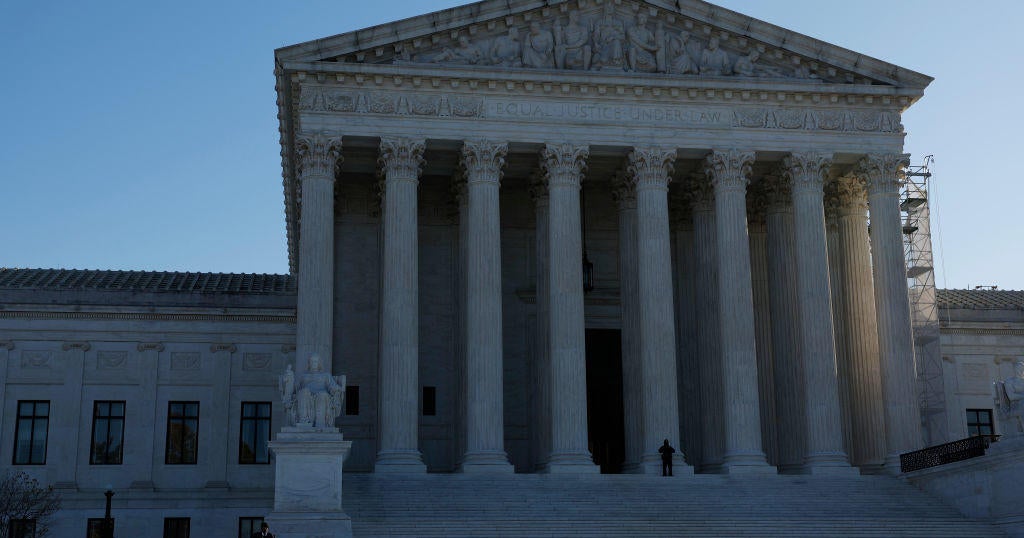
Washington — The Supreme Court on Wednesday agreed to consider South Carolina health department’s effort to cut off funding from Planned Parenthood because it performs abortions, wading into another dispute over access to the procedure in the wake of its reversal of Roe v. Wade.
The case, known as Kerr v. Edwards, stems from the state’s decision in 2018 to end Planned Parenthood South Atlantic’s participation in its Medicaid program. Gov. Henry McMaster, a Republican, directed the South Carolina Department of Health and Human Services to deem abortion clinics unqualified to provide family planning services and end their Medicaid agreements.
Planned Parenthood operates two facilities in the state, one in Charleston and the other in Columbia, and provides hundreds of Medicaid patients with services like physicals, cancer and other health screenings, pregnancy testing and contraception. Federal law prohibits Medicaid from paying for abortions except in cases of rape or incest, or to save the life of the mother.
Planned Parenthood and one of its patients, Julie Edwards, sued the state, arguing that cutting off its funding violated a provision of the Medicaid Act that gives beneficiaries the right to choose their provider.
A federal district court blocked South Carolina from ending Planned Parenthood’s participation in its Medicaid program, and a U.S. appeals court upheld that decision, finding that Edwards could sue the state to enforce the Medicaid Act’s free-choice-of-provider requirement.
The legal battle has already been before the Supreme Court in the past, with the high court last year ordering additional proceedings after deciding in a separate case that nursing home residents could sue their state-owned health care facility over alleged violations of civil rights.
After reconsidering its earlier decision, the three-judge appeals court panel ruled unanimously in March that Edwards’ lawsuit against the state could go forward and said South Carolina couldn’t strip Planned Parenthood of state Medicaid funds.
“This case is, and always has been, about whether Congress conferred an individually enforceable right for Medicaid beneficiaries to freely choose their healthcare provider. Preserving access to Planned Parenthood and other providers means preserving an affordable choice and quality care for an untold number of mothers and infants in South Carolina,” Judge Harvie Wilkinson wrote for the 4th Circuit panel.
South Carolina officials asked the Supreme Court to review that decision, marking the third time the case has been before the justices. The justices agreed to take up the question of whether “the Medicaid Act’s any-qualified provider provision unambiguously confers a private right upon a Medicaid beneficiary to choose a specific provider.”
South Carolina is among the more than two dozen that have passed laws restricting access to abortion in the wake of the Supreme Court’s June 2022 decision reversing Roe v. Wade. In South Carolina, abortion is outlawed after six weeks of pregnancy with some exceptions.
Several states have also enacted laws blocking Planned Parenthood from receiving Medicaid funding, including Arkansas, Missouri, Mississippi and Texas.
CBS News
Lithium battery fires on U.S. flights now occur nearly twice a week, according to new FAA data

As millions prepare to fly for the holidays, the Federal Aviation Administration is warning travelers about a hidden danger in their luggage: lithium-ion batteries. Found in everyday devices like laptops, tablets and even electric toothbrushes, these batteries can catch fire if they overheat or are damaged.
Last July, panic erupted on an American Airlines flight from San Francisco to Miami after a laptop battery in a carry-on bag ignited.
“It was absolute chaos. It truly felt like every man for themselves. And it was terrifying,” said Shilpa Patel, a passenger on the flight. “I don’t know if we’re going to explode. All I know is I need to get out and I need to survive.”
FAA data shows that lithium battery fires on U.S. flights have risen 388% since 2015, now occurring nearly twice a week.
“Any fire at 30,000 feet is unacceptable,” said David Wroth of UL Standards & Engagement, a safety research organization.
A survey of more than 800 flight attendants conducted by UL found that 87% are concerned about lithium battery risks on airplanes, and more than a third believe airlines should do more to ensure passenger safety. While the FAA requires airlines to include general safety information in preflight announcements, those warnings often don’t address the specific risk of battery fires.
“It’s a balance we probably need to do a better job striking with the airlines,” said Ben Supko, who oversees hazardous materials safety for the FAA. “Passengers don’t fully understand how serious the risk is.”
Supko said passengers need to monitor devices during a flight and immediately notifying the crew if a device becomes warm, discolors, or bulges. Passengers are also warned not to pack lithium batteries in checked luggage, as fires in the cargo hold are harder to extinguish.
“When you don’t know what’s going to happen, you act erratically,” said Patel. “It costs us nothing just to say, ‘Hey, the reason why we’re so serious about this is because it could be really dangerous. It could catch fire.'”
The UL survey also found that one in four passengers admits to packing lithium batteries in their checked bags. It is a dangerous practice for one reason in particular: It would be even harder to put out a fire in the plane’s cargo hold.
CBS News reached out to American Airlines regarding the incident at the San Francisco airport and potential updates to its safety announcements. The airline did not address the question directly but stated that its flight attendants receive thorough and ongoing training to handle emergencies onboard.
CBS News
Eye Opener: Update on possible motives in Wisconsin school shooting

Watch CBS News
Be the first to know
Get browser notifications for breaking news, live events, and exclusive reporting.


